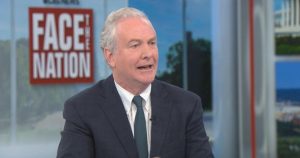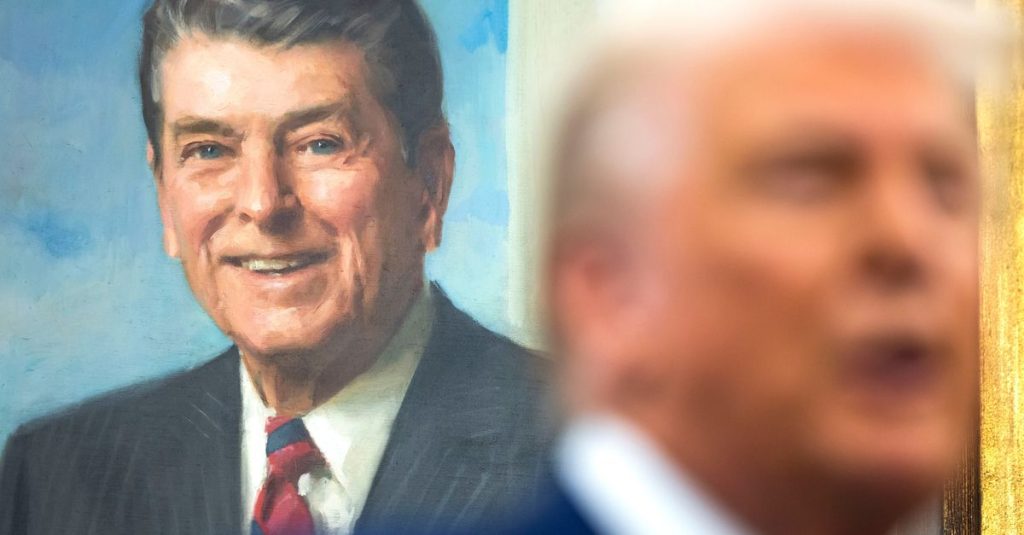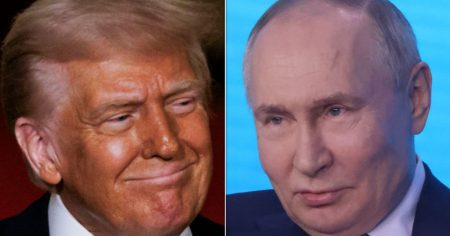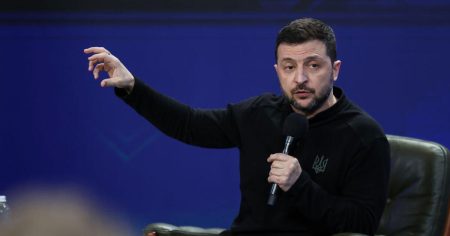A Stark Contrast: Trump’s Capitulation to Putin and the Ghost of Reagan
The Oval Office, the symbolic heart of American leadership, currently sits under the shadow of a monumental shift in U.S. foreign policy. Above the Resolute Desk hangs a portrait of Ronald Reagan, the 40th president, whose legacy as a steadfast defender of freedom and democracy is being starkly contrasted with the actions of the 47th president, Donald Trump. This week, Trump’s words and deeds have sparked outrage and dismay, particularly among those who once admired Reagan’s unwavering resolve against authoritarianism. For Reaganites like Tom Nichols, a former Naval War College professor, Trump’s capitulation to Russian dictator Vladimir Putin is nothing short of “absolutely obscene.” Nichols even suggested that Reagan’s portrait should turn its back in shame at Trump’s betrayal of the values Reagan once championed.
The Reagan Legacy: A Champion of Freedom and Democracy
Reagan’s presidency was defined by his unrelenting opposition to the Soviet Union, which he famously labeled the “evil empire.” His leadership was marked by a commitment to human rights and a determination to challenge Soviet expansionism. In 1987, Reagan stood at the Brandenburg Gate in Berlin and delivered a speech that became a defining moment of the Cold War: “Mr. Gorbachev, tear down this wall.” His words were a call to action, a demand for freedom, and a direct challenge to Soviet hegemony. Reagan’s vision for Eastern Europe was one of liberation, and his policies were designed to weaken the Soviet grip on the region.
Fast-forward to 2025, and the contrast could not be more profound. Trump, when pressed about Putin’s responsibility for the devastation in Ukraine, dismissively said, “I get tired of listening to that.” This response encapsulates Trump’s startling alignment with Putin’s narrative, which blames Ukraine for Russia’s invasion. Over the past week, Trump has parroted Putin’s talking points, labeled Ukraine’s democratically elected president, Volodymyr Zelenskyy, a “dictator,” and even suggested that Ukraine should hand over mineral rights as a form of “protection money” in exchange for American aid. His demands for Ukraine to concede territory seized by Russia, while asking nothing of Putin, have left many questioning his grasp of global geopolitics and his commitment to democratic values.
Trump’s Pro-Putin Shift and the Abandonment of Reagan’s Ideals
Trump’s recent remarks are not an isolated incident but rather the culmination of years of fascination with authoritarian leaders, particularly Putin. His admiration for strongmen dates back to 2013, when he mused on social media about whether hosting a beauty pageant in Moscow might win him Putin’s approval. This fascination has only deepened over time. Trump’s presidency was marked by repeated attempts to curry favor with Putin, from seeking to build a Trump Tower in Moscow to soliciting Russian help during the 2016 election. His willingness to embrace conspiracy theories concocted by Russian operatives, which falsely blamed Ukraine for interfering in the 2016 election, further underscored his alignment with Putin’s interests.
This week, Trump’s national security adviser, Mike Waltz, added fuel to the fire by “both-siding” the conflict in Ukraine, implying that there was equal blame on both sides. This response was reminiscent of Trump’s own tendency to deflect responsibility from Putin. For years, Trump has downplayed Russia’s aggression, even going so far as to label Putin’s invasion of Ukraine “genius” and “savvy.” His personal antagonism toward Zelenskyy, which seems to stem from the events surrounding his impeachment, has only intensified his pro-Putin stance.
The Party’s Transformation: From Reagan to Trump
The Republican Party, once the party of Reagan, has undergone a dramatic transformation under Trump’s influence. During Trump’s first term, figures like John Bolton and Mike Pence tempered his pro-Putin tendencies, but those voices are now gone. The party’s shift is not just ideological but moral, as it increasingly abandons the values of freedom, democracy, and human rights that Reagan championed. At the Conservative Political Action Conference (CPAC) this week, House Speaker Mike Johnson made it clear that there is little appetite for continuing U.S. aid to Ukraine, a stance that aligns with Trump’s isolationist and pro-Putin agenda.
For Mark Salter, a longtime aide to the late Senator John McCain, this transformation is nothing short of a “moral rot.” Salter lamented that the GOP is no longer the party of Reagan, as few of its leaders possess the sense of honor and integrity that Reagan once exemplified. The party’s capitulation to Trump’s authoritarian tendencies has led to an ideological decay that threatens the very foundations of American leadership on the world stage.
The Risks of Trump’s Approach and the Future of U.S. Leadership
Trump’s actions are not just a betrayal of Reagan’s legacy; they also pose a significant risk to global stability. According to experts like Tom Nichols, Putin is far more dangerous than any Soviet leader, as he operates with unchecked power and a deep understanding of how to manipulate leaders like Trump. Nichols warned that Trump is “playing with fire” by siding with Putin, whose aggressive expansionism threatens to destabilize Europe and beyond.
The implications of Trump’s approach extend far beyond the current conflict in Ukraine. If Trump were to take the next logical step and begin sending U.S. military assistance to Russia, it would mark a complete abandonment of American values and a betrayal of its allies. While this scenario may seem extreme, the past week has shown that even the most outlandish possibilities can quickly become reality under Trump’s leadership.
As the 2024 presidential election approaches, the question on many minds is: What will the next four years look like under Trump’s leadership? The answer, based on his recent actions, is both alarming and uncertain. One thing is clear: The GOP’s abandonment of Reagan’s ideals and its embrace of Trump’s authoritarian tendencies have set America on a dangerous path, one that could have far-reaching consequences for decades to come.















